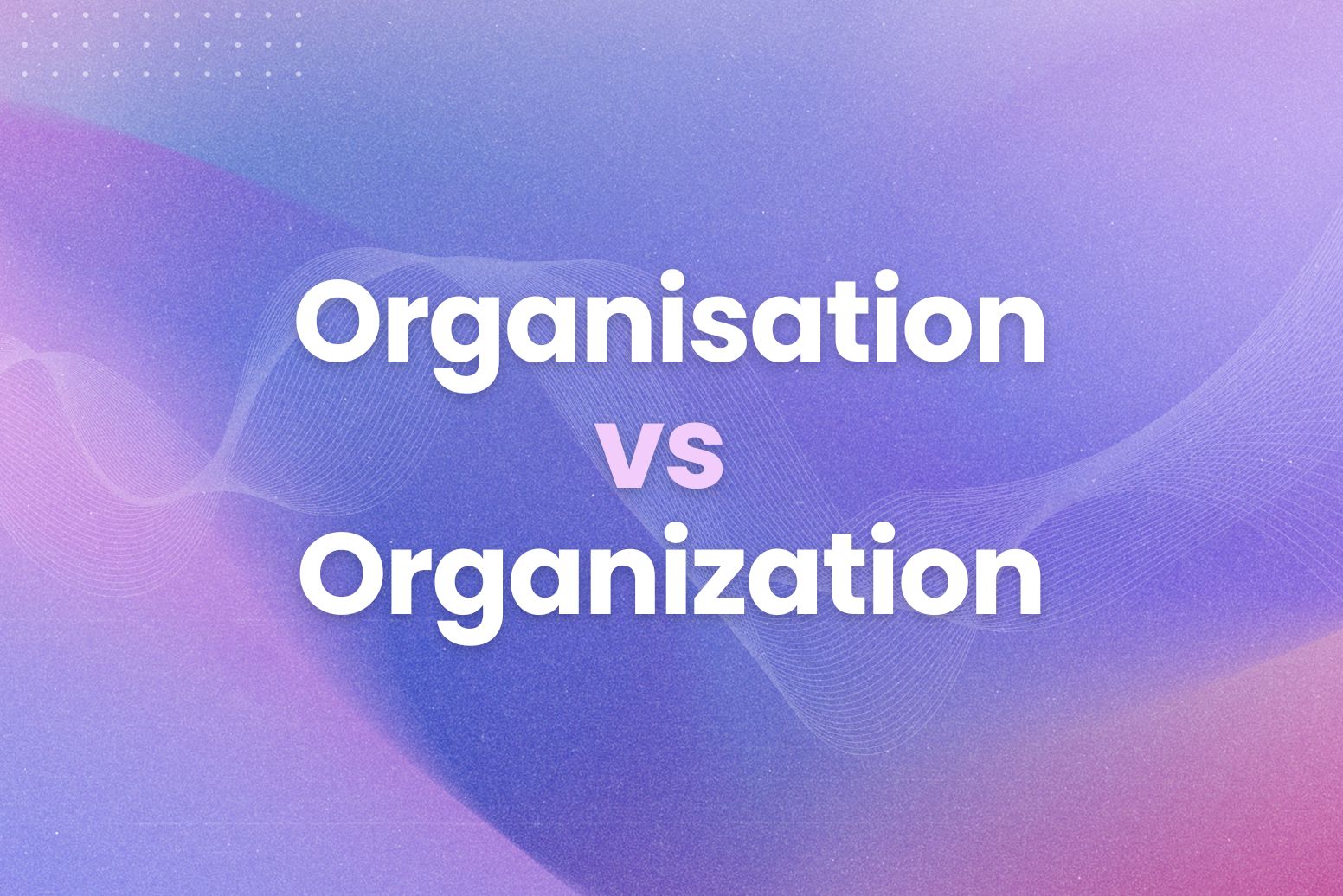Misspelling a word in an important email or document can undermine your credibility. It’s a small detail, but it makes a big difference. One common point of confusion is the spelling of organization versus organisation. Is it an American or British English thing? Yes, but there’s more to it.
This article clears up the confusion once and for all. In short, we’ll cover:
- The difference between organisation vs organization.
- When to use each spelling.
- Why this difference exists.
- How to avoid making this mistake.
The Difference Between Organisation vs Organization
The difference between organisation and organization is simple: one uses an “s,” and the other uses a “z.” For instance, organization is the standard American English spelling. On the other hand, organisation is the preferred spelling in British English and other Commonwealth countries. This difference is one of the most common variations between the two major English dialects. As a result, it often trips people up.
So, how did this happen? The difference stems from historical spelling reforms. Specifically, in the 19th century, American lexicographer Noah Webster promoted simplified spellings in his dictionaries. For example, he favored “-or” endings over “-our” (like color instead of colour). Consequently, this change became standard in American English. Meanwhile, British English retained the older spellings. Therefore, we have this common spelling difference today.
This distinction isn’t just about this one word. Similarly, other words follow this pattern. For instance, recognize/recognise, analyze/analyse, and itemize/itemize follow the same rule. In short, “-ize” is generally American, and “-ise” is generally British. This consistency makes it easier to remember.
When to Use Each Spelling
Knowing the difference is only half the battle. You also need to know when to use each spelling. For example, if you’re writing for an American audience, use organization. This includes business documents, academic papers, and general correspondence. Likewise, if you’re targeting a British or Commonwealth audience, use organisation. This maintains consistency and shows attention to detail.
So, what if your audience is mixed or unclear? In this case, choose one spelling and stick with it. Consistency is key. For instance, if you’re writing for an international publication, check their style guide. This will tell you their preferred spelling. Similarly, if there’s no style guide, pick either American or British spelling and use it throughout.
Therefore, avoid mixing spellings within the same document. It looks unprofessional. For example, using organization in one paragraph and organisation in another creates confusion. In short, choose one and be consistent. This is the best approach.
Why This Difference Exists
The difference between organisation and organization isn’t random. As mentioned earlier, it’s a result of historical spelling reforms. Specifically, Noah Webster’s influence on American English played a big part. For instance, Webster believed simplified spellings were more logical. Consequently, he advocated for changes like “-or” instead of “-our.”
So, why did Britain stick with the older spellings? In contrast to America, Britain didn’t undergo the same widespread spelling reforms. Therefore, they retained spellings derived from French and other European languages. For example, words like colour, honour, and favour kept their “u.”
This difference reflects the separate paths of American and British English. Similarly, other language variations exist between the two. For instance, vocabulary differences and pronunciation variations are also common. In short, the organisation/organization difference is just one example of how languages evolve over time.
How to Avoid Making This Mistake
Avoiding this mistake is simpler than you might think.
- Firstly, determine your target audience. If you’re writing for Americans, use organization. On the other hand, if your audience is British or from a Commonwealth country, use organisation. This is the most important step.
- Secondly, use your word processor’s spell check. Many programs allow you to select your preferred language (e.g., “English (US)” or “English (UK)”). This will automatically flag incorrect spellings. For instance, if you select “English (US)” and type organisation, it will likely be marked as an error.
- Thirdly, use online grammar tools. These tools can check for spelling and grammar errors, including this specific issue. For example, Arvin, our AI browser extension powered by GPT-4, offers advanced grammar checking. Arvin can catch these subtle spelling differences and help you write with confidence on any webpage. You can even use Arvin to translate content, generate images, conduct research, and more. It’s a complete writing assistant at your fingertips. So, with Arvin, you can easily avoid this common mistake and ensure your writing is always polished.
- Finally, create a cheat sheet of common UK/US spelling differences. This can be a simple list of words like colour/color, centre/center, and travelled/traveled. Consequently, you can quickly refer to it when needed. In short, with a little attention and the right tools, you can easily avoid this common spelling error.
Get Spelling Right, Every Single Time, With Arvin
In short, the difference between organisation vs organization boils down to British versus American English. Knowing this distinction and using the right tools can help you avoid this common spelling mistake.
So, remember these key points on organisation vs organization:
- Organization is the American spelling.
- Organisation is the British spelling.
- Choose one spelling and stick to it.
- Use spell check and grammar tools.
Writing clear, error-free content builds credibility. Arvin can help you achieve this. With its advanced grammar checking and other powerful features, Arvin ensures your writing is always polished, no matter which side of the organisation/organization debate you’re on. Try Arvin today and experience the difference.
FAQs About Organisation vs Organization
Is there a difference between organisation vs organization?
Yes, there’s a difference. Organization is the standard American English spelling. Organisation is the standard spelling in British English and other Commonwealth countries. They mean the same thing, just spelled differently.
Is it organization or organisation in the UK?
In the UK, the correct spelling is organisation. This follows British English spelling conventions. Therefore, you should use this spelling when writing for a UK audience.
How do you spell organization in Canada?
In Canada, both spellings are acceptable, but organisation is more common due to Canada’s historical ties to British English. However, many Canadian publications and style guides accept organization as well. It’s best to check a specific style guide if you’re writing formally.
Is it organize or organise in the UK?
Similarly to the noun forms, organise is the correct spelling in British English, while organize is the American spelling. This pattern holds true for other related words like recognise/recognize and analyse/analyze. In short, “-ise” is British, and “-ize” is American.






